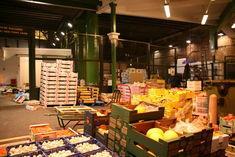
Global weather patterns and new markets in expansion are combining to produce an unprecedented situation of tight supplies and rising prices across several major lines in the UK fresh produce market, while supermarkets continue to promote on prices set months ago.
Persistent rain in parts of South Africa is taking its toll on the grape crop. Frosts in Israel are already affecting supplies of salad lines, and soon avocados will be hit too. Lemon prices are at an all-time high, and orange growers in Egypt and Greece cannot pack because of the rain, while even bananas are running tight and experiencing rising prices.
“Weather is always an issue, but I have never known a situation like this,” said Jonathan Olins, managing director of Poupart Imports. “I can’t remember a January like it, with so many different countries around the world affected.”
Although most grapes had already been picked in South Africa’s Orange River when rainfall struck last week, precipitation in the Hex Valley and Berg River production areas is cause for concern. “It shouldn’t be raining at this point in the season and it is going to have an impact on volumes,” said Capespan UK md Ronan Lennon. “There is likely to be a big impact on the availability of red grapes, which are already tight in the UK, and being sold at high prices on the spot market. Prices have been hovering in the 1100-1200p-a-carton region, at a time when they would normally fall to around 700p.”
Lennon foresees the grape shortage continuing for the next five to six weeks. “This is good for the grower, but we are seeing a huge gap between the prices on offer for traded product in the UK and on the continent, and the returns available from UK supermarkets,” he said.
The differential is running at around 30 per cent, with the fixed-price fruit heading for supermarkets at the lower end of that scale. “It will be interesting to see the reaction of the growers at the end of the season, when they tot everything up,” said Lennon. “Markets in the Far East and Russia are opening up for South Africa and this year they are paying far better money. It may be a one-off season and an anomaly, but some growers are bound to question their route to market.”
Olins believes it may not be an anomaly. “Climate will always be an issue, but I believe climate change will create more opportunities for those operating outside the supermarket sector,” he said. “We have a diverse product range and our business is certainly growing. I think there are going to be more advantages for growers who can look at all opportunities outside the supermarkets.”
In 2007, tropical storm Olga wiped about 40 per cent of banana production out in the Dominican Republic, and cold weather in Ecuador has dented yields. Meanwhile, high winds have affected shipping schedules for the fruit. “This year, more than last year, we are seeing a very short situation and very strong spot market banana prices,” said one banana ripener.
One importer who works across all sectors of the market, not just wholesale, believes that expansion of previously underdeveloped markets is taking its toll. “Former eastern bloc countries have more buying power and are not as rigid about specification as the UK, and these are now real alternatives for countries such as Spain and South Africa,” he said. “Prices in the UK are finally at a more realistic level, perhaps for the first time in 20 years. I am not sure how long the situation will last, but I hope it is a trend that continues. Supermarket prices are a false price - they are not market driven, and growers worldwide have an increasing number of alternatives.”



